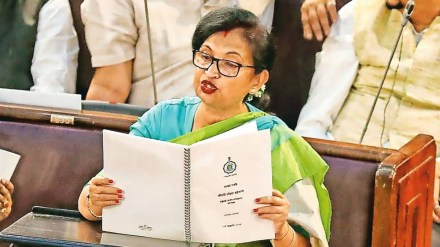The West Bengal government on Wednesday presented a Budget for 2023-24, envisaging total expenditure of 3.1 trillion, up 8% from the revised estimate of2.87 trillion in the current financial year. The Budget’s thrust was on support to farmers, an ailing tea sector, and also aimed to harness the state’s potential as a logistics hub, besides spurring budding entrepreneurs.
Finance minister Chandrima Bhattacharya said: “In spite of severe impact of Covid -19 pandemic and various natural calamities in the last two years, our state has maintained a steady growth. While the Indian economy is expected to grow at 6.95% in the current financial year (2022-23), West Bengal economy is expected to grow at a higher rate of 8.41% in the same period.”
The state’s total revenue receipts, including own tax receipts and transfers from the Centre, re estimated to grow by 9.7% to Rs 2.14 trillion in 2023-24 from Rs 1.95 trillion (RE) in 2022-23. Own tax revenue is seen to grow by 11.4% to Rs 88,595 crore in 2023-24.
The minister said an upcoming West Bengal Logistics Policy 2023 will leverage the state’s strategic position at the cross-roads of South Asia and Asean nations to create a global logistics hub. “It will streamline the sector and help Bengal to secure a strategic position in the global supply chain,” Bhattacharya said.
The development of an Industrial and Economic Corridor with three branches – Dankuni-Haldia, Dankuni-Raghunathpur and Dankuni-Kalyani — “will provide better connectivity and create employment opportunity for about one lakh people,” she added.
The minister also said a Rs 350-crore fund will be set up to extend credit of up to Rs 0.5 million each to 200,000 young entrepreneurs.
Fiscal Deficit is estimated at Rs 65,834 crore for FY24 compared with Rs 61,901 crore in FY23RE and Rs 50,528 crore in FY22.
Reacting to the budget, Vivek Jalan, Partner, Tax Connect Advisory, said “amidst increase in tax collections due to increased GST compliance and collections in Bengal, the focus has been on employment and industry.”
Announcing sops for the ailing tea sector and for rural areas, which will be witnessing panchayat polls soon, the finance minister said, “Agricultural income tax on tea gardens for 2023-24 and 2024-25 will be waived. Also, 11,500-km of rural roads will be constructed at a cost of Rs 3,000 crore under the ‘Rastashree’ scheme.”
“Allocation towards construction of old and new rural roads would boost the agrarian economy,” Jalan said.
Byasdeb Dasgupta, Head of Economics Department at Kalyani University, told PTI it is a populist budget, keeping in view the state’s revenue-earning constraints.
“Expenditure for road infrastructure development and a higher allocation for social welfare schemes along with the announcement of 3% dearness allowance are welcome, and will eventually help boost demand,” he said.
Asked about the high debt level of the Bengal government, he said, “The estimated debt was at Rs 5.86 trillion for 2022-23 and the same is projected at Rs 6.47 trillion for 2023-24, The increase in debt is not much of a concern in the short-run, as long as the state government’s revenue is increasing and the GSDP is growing,” Dasgupta said.
Secretary General of Indian Tea Association (ITA) Arijit Raha said the relief in the bugdet has come at a time when the tea industry was “going through an acute financial crisis, particularly after two years of Covid”. Besides, the budget proposes full waiver of charges on irrigation water supplied to farms, and exemption of payment of rural employment cess.
“I am happy to announce that my government will bring out a policy for issuance of homestead patta for eligible tea garden workers,” Bhattacharya said.
(With PTI inputs)
